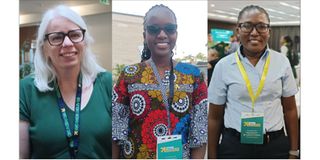The feminist agenda at the grassroots; advocates tell of experiences

Feminists Angie Dazé, director for gender equality and social inclusion for resilience at the International Institute for Sustainable Development; Faridah Ally, founder of Mombasa-based Elimu Care; and Joanita Babirye, co-founder and director at Girls for Climate Action in Uganda, on July 16, 2023, in Kigali, Rwanda.
What you need to know:
- Women-led organisations have work in the communities to build women's resilience to the fallout from climate change.
- They also promote girls’ access to education and support victims of gender-based violence.
For decades, women-led organisations have worked in the communities to build women's resilience to the fallout from climate change, promote girls’ access to education and support victims of gender-based violence. We speak with the young and old activists on their experiences working with women.
Ofa Guttenbeil-Likiliki
Offa is the director of Tonga's Women and Children Crisis Centre in Oceania. She started the organisation in 2009. In her country, communities are often hit by cyclones and tsunamis, and women suffer the most. But they are excluded when it comes to designing the response and recovery plans, yet their priorities differ from that of men.
“Last year, we went to the communities following the outbreak of Covid-19 and volcanic eruption, and men had different priorities from women,” she says.
“The men were more interested in receiving the food and clothing donations, but the women said they needed most hygiene products to keep their families clean and protect them from contracting diseases.”
The grassroots women activists, too, struggle to have their voices included in the intervention programmes.
“Certain buzzwords fly around in the humanitarian and development spaces such as locally led, localisation and multi-year co-funding, yet there is a level of colonialism,” she states.
“Often donor agencies fly in and out the so-called experts, but there has to be an understanding around co-design; allowing the experts on the ground with skills, knowledge and experience to come up with what's needed, what needs to be addressed,” she argues.
Joanita Babirye
She is the co-founder and director at Girls for Climate Action, a feminist organisation based in Uganda. They launched it in 2014. She says: “We don't take solutions to our communities because they are already adapting to climate change.”
“The climate solution used by one woman in her household can be upscaled to benefit many others. The only thing we do is guide the process to make sure that the innovation grows into something big,” she says.
Women, she says, use indigenous knowledge to fight crop pest infestation and make energy cooking stoves.
“We have, however, realised new pests threaten their food security. And so what we have done is bring in university students to grow crops with the farmers. And in the process, they learn new ways of protecting their crops from pest attacks,” she says.
“The women also use mud and sweet potato leaves to make the energy saving stoves. They know how to solve their problems.”
Faridah Ally
Faridah is a 24-year-old education activist who founded Mombasa based Elimu Care in 2020. She says her work has taught her that addressing education inequalities goes beyond paying school fees.
“Paying school fees for girls isn’t enough of a solution. We need to involve the whole community,” she says.
“We begin with empowering communities to see the value of education and fight against other ills that prevent girls from accessing education like gender based violence (GBV).
“Then we offer psychosocial support to parents who have gone through GBV to regain their mental health and capability to parent their children well. Afterwards, equip them with skills on starting and managing a profitable business to sustain their families.”
Angie Dazé
Angie has been in the development sector for more than two decades. Currently, she is the director for gender equality and social inclusion for resilience at the International Institute for Sustainable Development, which hosts the secretariat of the National Adaptation Plan (NAP) Global Network, a movement that advances adaptation planning and action in developing countries through NAP processes.
She says countries are increasingly becoming more responsive to women’s priorities in climate response and mitigation. In developing NAPs, countries depend on the latest climate science to identify specific medium- and long-term adaptation needs for action.
“What we are seeing now is more integration of gender issues,” she says. “At the beginning we saw women movements positioned as a vulnerable group, now we see more countries position women as agents of change.”





